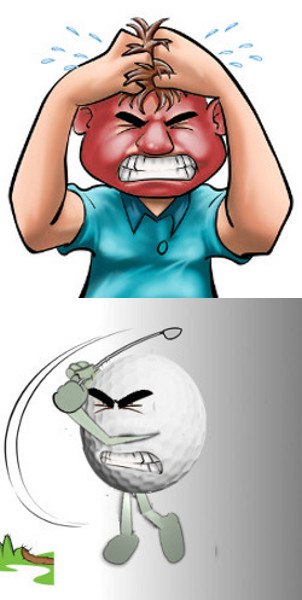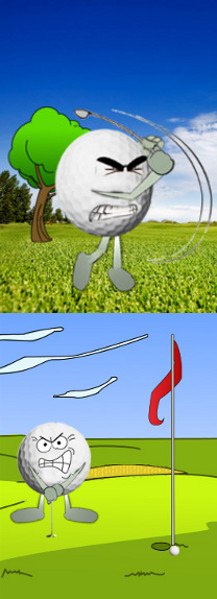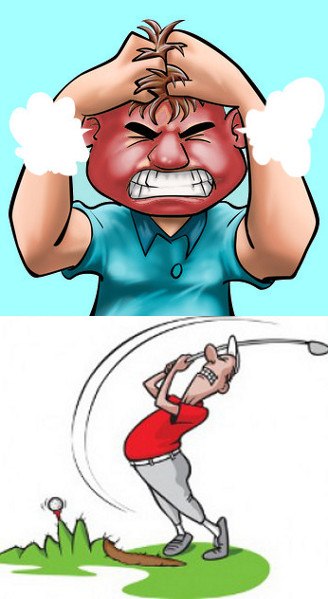
The number of all-time golf greats with bad tempers can be counted on one hand – maybe one finger.
Tiger Woods is unquestionably the best ill-tempered player in history, what with 14 major titles, countless curse words and a trunk full of slammed clubs. Tommy Bolt, aka “Terrible Tommy,” made club-throwing an art form but managed to win 15 PGA Tour events, including the 1958 U.S. Open. Others, like Steve “The Volcano” Pate and Pat “Mini-Volcano” Perez, have probably been held back by their explosive emotions.
The point is, it's difficult to play well once you blow your top. Physiological and mental agitation wreak havoc on tempo and focus. Yet as anyone with anger-management issues can attest, putting a lid on your rage can be tougher than curing a slice.
If you're the rare breed whose game is unaffected by an angry outburst, you'd still be well served to rein it in. You've probably walked off the course embarrassed by your behavior a time or two, right? Maybe you've broken a club here and there, or taken a chunk out of the green after missing a 2-foot putt? In any case, losing your cool always comes with consequences.
Here are a few ways to keep your temper in check on the course:
- Determine what makes you angry: Some golfers are so focused on score, a single bad hole can send them into the stratosphere. Others are overly competitive with their playing partners. Still others can't abide mental mistakes, or repeating the same error over and over, or being slowed by the group ahead. Figure out which situations tend to set you off and you'll be on your way to a tamer temper.
- Set reasonable expectations, then give yourself the grace to fall short: Woods sets extremely high standards for himself. How about you? Do you expect to hit every shot perfectly? Do you start each round with a target score in mind? If so, you'll naturally be disappointed when you come up short. Assess your skills honestly, set your goals accordingly, and don't beat yourself up when things go awry. Your wife, kids and/or dog will still love you when you get home.
- Adopt a process-vs.-outcome approach: If you expect to shoot a specific number or stand on the tee thinking “I have to birdie this hole,” you're setting yourself up to fail. Instead, focus on the task at hand, as in the next shot and the next shot only. Develop a sound pre-shot routine and follow it every single time. You'll become more consistent and block out distracting thoughts about your score.
- Analysis over emotion: If you throw a tantrum after a bad result, you're missing an opportunity. Analyzing mistakes is the key to improvement – and to avoiding the same mistakes again. When you feel anger welling up, step back mentally and take an objective look at what just happened. Did you overswing? Fail to account for the wind? Decelerate the putter? Process the info and store it away for future use.
Above all, keep things in perspective. The cliché is undeniably true: It's only a game. Just think of how many people would gladly trade places with you right here, right now, on this beautiful golf course. That's nothing to be upset about.

Temper – Control Your Emotions, Control Your Game
To someone who doesn't play the game, golf looks like a relaxing way to spend a few hours. You get to wander through beautiful green grass, enjoy the sunshine and maybe some trees or ponds, and generally just have a good time with your friends. Rather than causing anger, golf seems like a game that would be downright therapeutic.
As a golfer, however, you know better. Despite its calm presentation, golf is a game that can incite serious frustration even among the most mild-mannered people. There is something about the challenge of the game that leads players to become extremely angry from time to time, even during casual rounds. It doesn't matter if you are a pro-level player or a complete beginner, all golfers know the feelings of frustration that can accompany this game.
Unfortunately, those feelings are rarely helpful when it comes to playing good golf. Losing your temper is a sure way to increase your score, and you probably won't have as much fun, either. Hitting good golf shots is a serious challenge under the best of circumstances, but it can become nearly impossible when you add in the element of frustration or anger. If you hope to reach your potential on the course, you will need to learn how to channel your emotions in a positive direction so they can help you thrive throughout the round. There is nothing wrong with getting mad at yourself for hitting a bad shot, as long as you don't let that emotion spiral out of control. The best players in the world certainly get angry from time to time, but they understand how to regain control in order to perform.
There are plenty of good reasons to work on handling your temper on the course. For one, you should shoot better scores consistently when you don't stay mad for very long. Also, you will have more fun – and you will be more fun to play with – when you manage your temper successfully. Even if you are a good golfer, you can quickly run out of people who want to play with you when yelling and throwing clubs is a regular part of the experience.
The content below contains a variety of tips and hints to help you manage your temper successfully during a round of golf. It is important to note that managing your temper doesn't mean that you have to stop caring or stop getting mad altogether. Frustration is a natural response when you don't feel like you are meeting your potential, whether it is on the golf course or in any other walk of life. Hopefully, you can use the ideas below to walk the line between healthy competitive fire and completely losing your temper out on the course.

Basic Rules of Temper Control
Tempers, just like golf swings, are individual in nature. The temper that you have in your daily life, as well as on the golf course, is unique to you. It may take a lot to get your frustrated or angry, or it may just take one specific incident to flip that switch. Only you truly understand your own emotions and triggers, so it will be up to you in the end to control them successfully.
However, there are a few basic rules that can be applied across the board when it comes to tempers on the golf course. If you are able to follow the rules highlight below, you should be well on your way to controlling your emotions properly from the first hole to the last.
- Never let it linger. This is the golden rule of managing your emotions on the golf course. No matter what, you can't let the anger or frustration of a bad shot carry over to the next shot. For example, imagine that you hit a terrible drive off the tee of a par four, and your ball soars into the trees way to the left of the fairway. As you walk up the fairway, you are angry with yourself for making such a poor swing. You know that you are going to be in bad position for your next shot – if you are even able to find your ball at all. Once you do locate your ball, you are still frustrated and you decide to go for the green instead of just pitching out to the fairway. Going for the green from the trees results in another bad shot, and you wind up making a double or triple bogey on the hole. In this case, you would have allowed one bad shot (the tee shot) to lead to a bad decision (going for the green). If you had let go of the bad shot and calmed yourself down before the second, you may have been able to make a rational decision instead of an aggressive one based on emotion. Everyone hits bad shots on the golf course, but the good players are the ones who can regain control over their emotions prior to playing the next shot.
- Don't get in the way of others. Golf is meant to be a social game, and you should be behaving in a way that will make others want to play with you time and time again. So, when you get angry during a round, you will want to control those emotions well enough to stay out of the way of the others in your group. If you are throwing clubs across the fairway or yelling four-letter words on the greens, it is unlikely that you will be invited back very often. Find ways to vent your frustration quietly without making a scene and you will be a much more desirable playing partner.
- Mark your ball after a bad putt. Missed putts are a common cause of frustration on the golf course. Many players – even professionals – struggle with putting, so it is not uncommon to see golfers losing their cool around the hole. When you do miss a putt that you thought you should make, take a moment to mark the ball and take a deep breath. If you just walk up and hit the next putt while you are still steaming about the previous miss, there is a good chance you will miss yet again. It only takes a few extra seconds to mark the ball, pick it up, take a breath, and put it back down. This might seem like a simple step but it can save you from wasting additional strokes with the putter.
- Stick with the game plan. Another common mistake that is tied to temper problems is changing your game plan when you get frustrated. It goes like this – you make a bogey or double bogey on an easy hole that you expected to finish in par or better. As you walk to the next tee, you are mad about the mistakes you just made. Instead of sticking with your game plan and hitting an iron for position on the next hole, you hit driver because you want to make a birdie to get back on track. Usually, that kind of rash decision will go badly, and you will wind up following one poor hole with another. No matter what you did on the previous hole, stick with your regular game plan and playing style to best position yourself for success moving forward.
If you can follow the four rules listed above, you should be well on your way to successfully managing your temper on the golf course. It won't always be easy – especially after you miss a short putt or hit a ball out of bounds – but you will be rewarded in the long run with better scores on the card. Just like anything else in golf, you should expect to have to practice your temper control before you can count on it to be there for you time after time. Make this area of your game a priority if you want to be the best player you can be.

The Relationship Between Your Emotions and Your Golf Swing
Letting your emotions get out of control can easily lead to poor decisions on the golf course. As outlined above, many golfers let one bad hole (or even one bad shot) set them on a run of poor play for several more holes to come. One of the key skills for a golfer is the ability to put away those frustrations by the time the next shot comes around. This skill is not only important for decision making, but it can also help you to make better swings.
Most golfers excel when they manage to keep their swing long and smooth, rather than quick and abrupt. If you want to make beautiful golf swings with great rhythm and timing, you will need to manage your temper successfully. It is almost impossible to make quality swings when are mad, as your heart rate usually increases and you do everything faster than normal. Getting back down to a comfortable emotional state will do wonders for the quality of your swing.
With all of that said, it is still difficult to calm yourself down after a bad shot. A lot of practice goes into playing golf, and if you take the game as seriously as most players do, you will be frustrated when your practice doesn't translate into on-course success. The best plan is to have a specific strategy in place that you can use to relieve your anger and allow your mind to move on to the next shot. Try the following step-by-step process to let go of your frustration as quickly as possible following a bad swing or bad hole.
- The first thing to do is to watch the ball all the way until it lands – even if you aren't happy with the shot. Many golfers will turn away or put their head down when they see the ball flying off line, but that isn't going to help you solve any problems. You need to watch the entire shot to gather information about your ball flight that may help you get your swing back on track. Also, if the ball is flying well off-target, watching it the whole way will increase your chances of locating the ball for your next shot.
- Once the ball lands, hold your finish position for a couple of seconds while taking two or three deep breaths. Try to resist the temptation to throw your club or yell at yourself – just take a couple of nice breaths and relax for a few seconds.
- After your deep breaths, step back behind where you hit the shot and take a look at the path of your divot. Did you swing across the ball from one side to the other? Did you even take a divot at all? Gathering information is a great way to distract your mind from being angry. By getting back into the process of improving as quickly as possible, you can almost forget about being mad.
- Use the walk up to the next shot (or cart ride) to further relax your mind. Try to think about something other than golf in order to calm yourself down and let your frustrations drain away. Your goal should be to have completely forgotten about the anger you were feeling by the time you set your bag down for the next shot (or park the cart). If you can accomplish that goal each time you hit a poor shot, you will be doing a great job of managing your emotions.
It's hard enough to build a quality golf swing under the best of conditions. If you are playing while you are angry, you are making the game even harder than it has to be. Use the steps above to regain control after you make a poor swing and your game will benefit in the long run.

Performing Under Pressure
One of the most rewarding experiences you can have in golf is hitting a great shot, or playing a great round, when the pressure is on. The feeling of knowing that you can rise to the occasion and perform your best even while you are nervous is about as good as it gets for a golfer. Playing well under pressure is another area of the game that is tied to controlling your emotions. If you are angry at yourself or something else while trying to hit great shots in tight situations, you will mostly like fail in your attempt.
The challenge of playing golf while nervous is keeping your emotions on a level plane throughout the round. If you are going up and down in terms of your mood and level of excitement, you will never find the consistency you need to play quality golf. As you certainly know already, the most important part of playing good golf is making the same swing over and over again, hole after hole. That kind of consistency is difficult to achieve, but it is impossible if you allow your temper to get the best of you. Only when you can manage your emotions nicely from shot to shot will your best game be able to show up at the most critical times.
It doesn't matter what you are playing for, either, when it comes to getting nervous. Are professional golfers nervous when they have to make a putt to win a major championship? Of course – but you could be just as nervous when you are trying to make a putt to win your match in the club championship at your local course. Most golfers are competitive by nature, and that competitive drive means that you will care about the outcome of your shots no matter what is at stake. Along with caring comes nerves, so you need to be able to deal with your emotions properly throughout a round if you hope to be successful.
The challenge of performing under pressure becomes even greater when you realize that you are more likely to lose your temper when playing in competition as opposed to playing a casual round with your friends. It is important that you treat every shot that you hit – whether you are playing a round by yourself or playing in a local tournament – exactly the same. If you take some shots more seriously than others, you will run the risk of losing your temper when things don't go your way. Value each shot that you take, but never let one shot become bigger than it is. In the battle against your temper, perspective is a powerful thing.

Short Game Requires Total Control
As mentioned above, the way you control your temper has a profound impact on your golf swing. If you allow your emotions to get out of control, you will notice that the quality of your swing decreases significantly throughout the course of a round. In addition to problems with the full swing, your short game will quickly fall apart if you lose your temper. Great short game shots require a delicate touch, and there will be nothing delicate about your mood if you are still wound up about the poor shots you played earlier in the day. If you would like to make your share of putts and get up and down from some tough spots, you will work hard to maintain an even keel from the first tee to the last green.
The feeling of being angry on the golf course is much like the feeling that you get when you are out of breath from running. You can't quite bring your heart rate back down to normal, and you don't have the same level of feel in your hands. Do you think you would hit good short game shots after running a lap around a track? Probably not. In the same way, it is unlikely that you are going to hit good short shots while mad at yourself. As a golfer, you already know how hard the short game is when you are feeling good and full of confidence. Making it harder by playing these shots while mad is simply a mistake that you can't afford to make.
There is a unique aspect of the short game that should be mentioned here as it relates to controlling your mood. When you hit a bad full shot, you have at least a couple of minutes, if not more, to walk it off. By the time you get up to the next shot and it is your turn to hit, you will have had enough time to blow off some steam and get your head back in the game. That is a luxury you probably won't be afforded when you hit a bad short game shot. For example, imagine you are facing a challenging downhill chip shot from the long rough. In an effort to hit it just perfectly, you actually go under the ball and only hit it a couple of feet. The ball is still in the rough, and you are still facing a difficult chip – but you have added a wasted shot to your score.
Obviously, you are mad, but it is still your turn to play. You don't have the chance to 'walk it off' because you need to play your next shot within a few seconds. When this happens, your best course of action is to focus on the process at hand. Do your best to ignore the anger and immediately craft a game plan for the next chip. Pick out a specific landing spot and focus only on the execution of a great shot. There is nothing you can do to get back that previous mistake, so hit a quality shot and move on with your emotions under control.
It is easy to get mad on the golf course. In fact, pretty much every golfer has allowed their temper to get the best of them once or twice. To manage your frustrations successfully, you need to have a game plan. Use the advice contained above to keep yourself in a good frame of mind throughout each and every round that you play.






